About Legacy Healing Center – Parsippany
Legacy Healing Center located in Parsippany, New Jersey is a drug and alcohol rehab facility that offers addiction treatment programs to help you strive towards recovery. The center takes a holistic approach to healing and uses evidence based care along with personalized support to meet you where you’re at. Former clients have reported positive experiences at Legacy Healing Center, finding the environment to be welcoming and supportive.
The center is also located close to Lake Parsippany which can provide a peaceful respite out in nature where you can relax and reflect. This can be a great location to spend time with friends and family while receiving outpatient care.
Supporting You Through Medical Detox
At Legacy Healing Center, you can take the first step towards recovery with a medical detox. These will typically last anywhere from three to ten days, and you will be supervised by medical professionals to ensure your safety and comfort during withdrawal. Stabilization with the use of medication paired with counseling sessions and group meetings will help support you during the detoxification process.
Outpatient Care in Parsippany
Depending on where you are at in your recovery journey, Legacy Healing Center offers multiple levels of care with varying structures to best fit your needs. They provide a partial hospitalization program (PHP), intensive outpatient program (IOP), and standard outpatient program.
Through their whole person approach, your recovery plan could include a mixture of therapies, medication management, family involvement and expanding on life skills. Legacy Healing Center emphasizes the importance of having family and community members as sources of ongoing support.
Latest Reviews
Thank you so much for the 5-star review! We’re truly grateful for your kindness. Knowing that you’ve felt supported and cared for means everything to our team — it’s exactly why we show up every day.
We’re honored to be part of your journey and are always here to help however we can. Wishing you continued strength, clarity, and confidence as you move forward. You’re doing an incredible job, and we’re cheering you on every step of the way.
With appreciation,
The Legacy Healing Center Parsippany Team
Thank you so much for sharing this — we truly appreciate your kind words. It means a lot to know that your time here has made a positive difference, and we’re grateful for the trust you placed in us throughout your journey.
Your commitment to showing up, doing the work, and choosing healing each day is something to be proud of. We’ll absolutely keep putting our hearts into what we do, and we’re cheering you on as you continue building a strong and meaningful path forward.
Wishing you clarity, strength, and continued success — you’ve got this, and we’re honored to be part of your story.
With gratitude,
The Legacy Healing Center Parsippany Team
Thank you so much for sharing your experience, and welcome to Legacy — we’re truly honored to have you here. It means a lot to hear that you felt supported and welcomed right away. That first step into treatment can be overwhelming, and knowing you were met with open arms is exactly what we hope for every client 💙
We’re grateful for your kind words about our staff and clinical team. Anita, Heather, Anthony, and the rest of our team pour their hearts into making sure each person feels seen, supported, and set up for success. We’ll make sure they hear your shoutout — it will mean so much to them.
We’re proud of you for choosing to begin this chapter and are here to stand beside you every step of the way. You’ve got a whole team behind you, cheering you on.
With encouragement and gratitude,
The Legacy Healing Center New Jersey Team
Rehab Score
Gallery
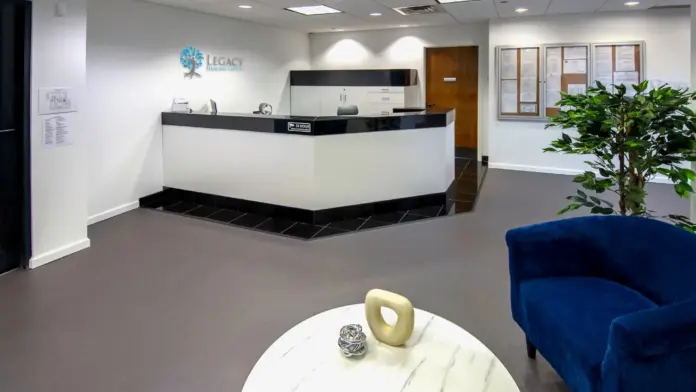
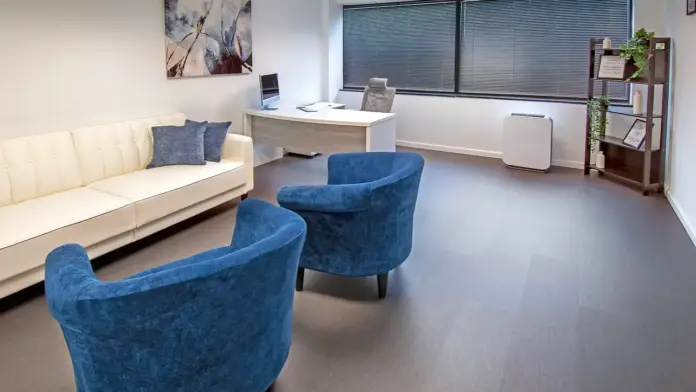
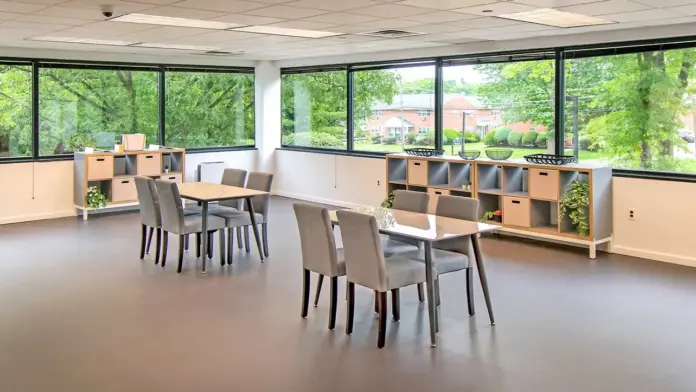
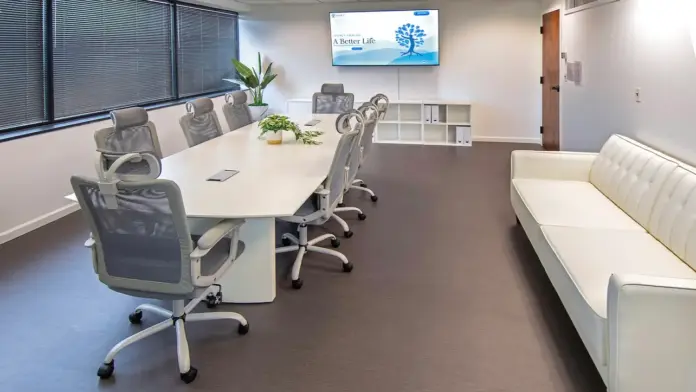
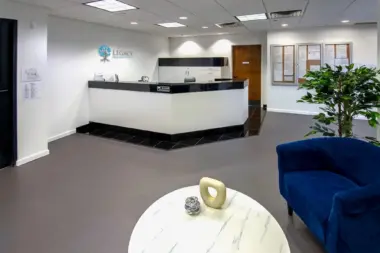
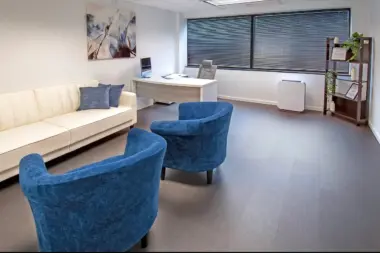
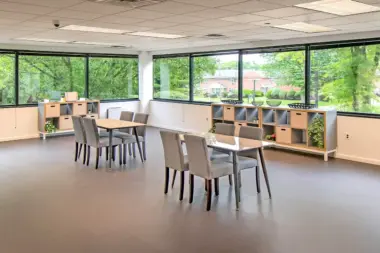
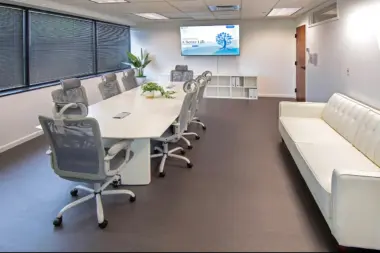
Accepted Insurance
Other Forms of Payment
Private insurance refers to any kind of healthcare coverage that isn't from the state or federal government. This includes individual and family plans offered by an employer or purchased from the Insurance Marketplace. Every plan will have different requirements and out of pocket costs so be sure to get the full details before you start treatment.
Self-pay involves paying for treatment out of your own pocket. You can use savings or credit, get a personal loan, or receive help from family and friends to fund your treatment. If you don't have insurance or your insurance plan doesn't cover a specific program, self-pay can help ensure you still get the care you need.
Addiction Treatments
Levels of Care
Clients often enter inpatient rehab following detox, but they may also enroll during early recovery or at an increased risk of relapse. Inpatient rehabs provide housing, meals, and intensive clinical supervision, allowing clients to focus exclusively on their recovery in a highly structured and supportive environment. Clients typically receive multiple individual, group, and/or family therapy sessions weekly. Many programs also offer extensive addiction education and recovery-focused life skills training. Integrative inpatient rehabs provide holistic therapies as well.
Clients who are exiting inpatient rehab, those who are experiencing crisis, and those who prefer to live at home while in treatment typically enroll in intensive inpatient programs (IOP). These programs feature frequent and robust care, generally requiring clients to participate in at least nine hours of care weekly, though many intensive outpatient rehabs offer up to 20 treatment hours per week. IOP services typically combine individual, group, and family counseling with recovery education and holistic therapies.
A partial hospitalization program (PHP) is a short-term, intensive outpatient option designed for those with moderate to severe addictions who don't require 24-hour care. PHP treatment is often fully covered by insurance and provides structured programming (i.e. individual and group therapy). A typical partial hospitalization program can meet 3-5 days a week for a minimum of 20 hours, offering intensive treatment during the day while allowing you to return home after. PHP treatment duration can vary based on your progress but averages 90 days.
Outpatient rehabs enable clients to receive a full continuum of care while continuing to live at home. They're often ideal for clients who are stepping down from inpatient care but some clients may prefer to transition into outpatient treatment immediately after completing detox. Many outpatient facilities also offer ambulatory medical detox for low-risk clients. Outpatient treatment generally includes psychotherapy and life skills training. Clients in opioid and/or alcohol recovery may also receive medication assisted treatment (MAT).
Telehealth is a real-time communication between you and your physician via telecommunications equipment. This might involve a video call, phone call, or medical app. It may also include the transmission of medical information via sharing technology.
Treatments
Alcoholism (alcohol use disorder) is diagnosed when a person's drinking causes harm or distress and they continue to drink anyway. Often, they have a physical as well as psychological dependence on the substance. To treat alcohol addiction, medical detox is often necessary to safely withdraw from alcohol. Once this is complete, alcohol rehab in New Jersey can provide skills and supports necessary for long-term recovery.
Drug rehab in New Jersey is the process of addressing the complex issues involved with addiction. Challenges are identified and addressed through individual and group counseling. Participants learn how to manage these issues without the use of substances.
You can find comprehensive substance abuse treatment in New Jersey in drug and alcohol rehabs. These treatment programs typically provide a full continuum of care including medically assisted detox, inpatient, outpatient, dual-diagnosis, and intensive outpatient. With a comprehensive substance abuse evaluation, addiction experts provide individualized treatment plans to meet your specific needs. These programs address substance use disorders using evidence-based therapies, like cognitive behavioral therapy (CBT) and dialectical behavioral therapy (DBT), individual and family counseling, and recovery support groups.
Programs
Adult rehab programs include therapies tailored to each client's specific needs, goals, and recovery progress. They are tailored to the specific challenges adult clients may face, including family and work pressures and commitments. From inpatient and residential treatment to various levels of outpatient services, there are many options available. Some facilities also help adults work through co-occurring conditions, like anxiety, that can accompany addiction.
Men face specific challenges and concerns when seeking addiction treatment. Gender-specific recovery programs help them tackle these issues head-on in an environment that's focused, targeted, and distraction-free. It also gives them the opportunity to connect with and learn from other men who have been through a similar journey and can offer support for the next step.
Rehabs for women provide a safe, nurturing space for female clients to heal. These treatment programs consider the specific obstacles that women can face during recovery and place a special emphasis on mental, social, physical, and reproductive health. They explore how each woman's experience has shaped the trajectory of their substance use, addressing issues such as sexual abuse and past trauma.
Clinical Services
Cognitive behavioral therapy (CBT) in New Jersey typically follows a set structure of treatment. The therapist helps clients identify their life challenges and their thoughts surrounding those challenges. The client then learns to identify unhealthy thought patterns and reshape those into healthy patterns of thinking and behavior.
Most experts in couples therapy are trained in several modes of treatment. This allows your therapist to draw from various techniques to personalize your therapy for your needs. This may include cognitive, emotional, and behavioral methods, which are all designed to help you strengthen your relationship.
Dialectical means opposing. The premise of dialectical behavior therapy is to learn how two things that seem to be opposite can actually be true. You learn how to accept yourself while also making changes. The focus is on accepting your emotions and changing how you manage them.
Family therapy sessions address addiction related conflicts and other issues between members of the family unit. By strengthening communication and coping skills, as well as creating a nurturing environment, the family can help support their loved one's recovery.
Group therapy settings offer you a diverse perspective on addiction and recovery. People from a variety of backgrounds gather together to discuss their challenges and speak openly and in a nonjudgmental atmosphere. This enriches your experience and your understanding of addiction and recovery.
During individual therapy for drug addiction, patients receive a customized and tailored approach to understanding their unique circumstances and providing them with targeted interventions. These include coping skills, relapse prevention plans, and developing resilience, all of which are essential for long term recovery.
Building life skills allows you to demolish negative patterns of behavior and build new, healthy patterns. By building new thought processes, coping strategies, and behaviors, you establish a solid foundation for recovery.
Motivational interviewing helps clients find their motivation to change. It can be an effective method to work with clients who are angry or hostile or feel insecure about their ability to make changes in their lives. It is often used during addiction treatment or to manage physical health conditions.
Nutrition therapy is more than a simple meal plan during rehab. It's designed to facilitate a faster recovery by giving your body the nutrients it needs to heal. It aids in strengthening your systems and giving you the energy you need for daily functioning and success in other therapies.
Trauma therapy provides a structure to approach healing from past traumatic events that you may have witnessed or experienced. Your therapist will work with you to identify and process these memories. This helps promote a sense of safety and stability and helps you heal emotionally.
Amenities
-
Gym
-
Private Rooms
-
Private Setting
-
Residential Setting
-
WiFi
Accreditations

The Substance Abuse and Mental Health Services Administration (SAMHSA) is a branch of the U.S. Department of Health and Human Services. Established in 1992 by congress, SAMHSA's mission is to reduce the impact of substance abuse and mental illness on American's communities.
SAMHSA Listed: Yes

The Joint Commission, formerly known as JCAHO, is a nonprofit organization that accredits rehab organizations and programs. Founded in 1951, the Joint Commision's mission is to improve the quality of patient care and demonstrating the quality of patient care.
Joint Commission Accreditation: Yes
Contact Information
300 Littleton Rd
Parsippany, NJ 07054


